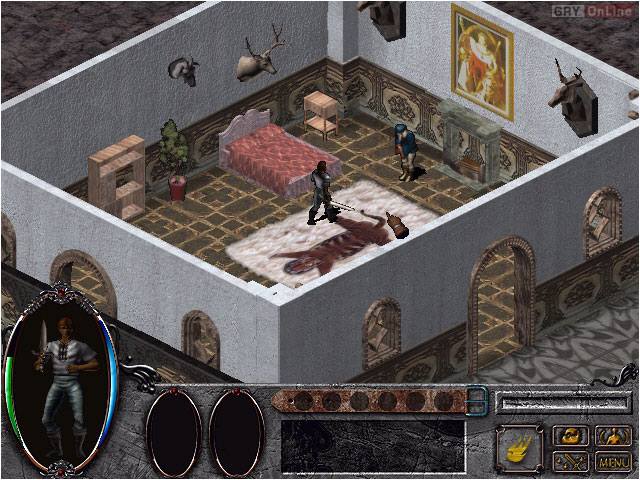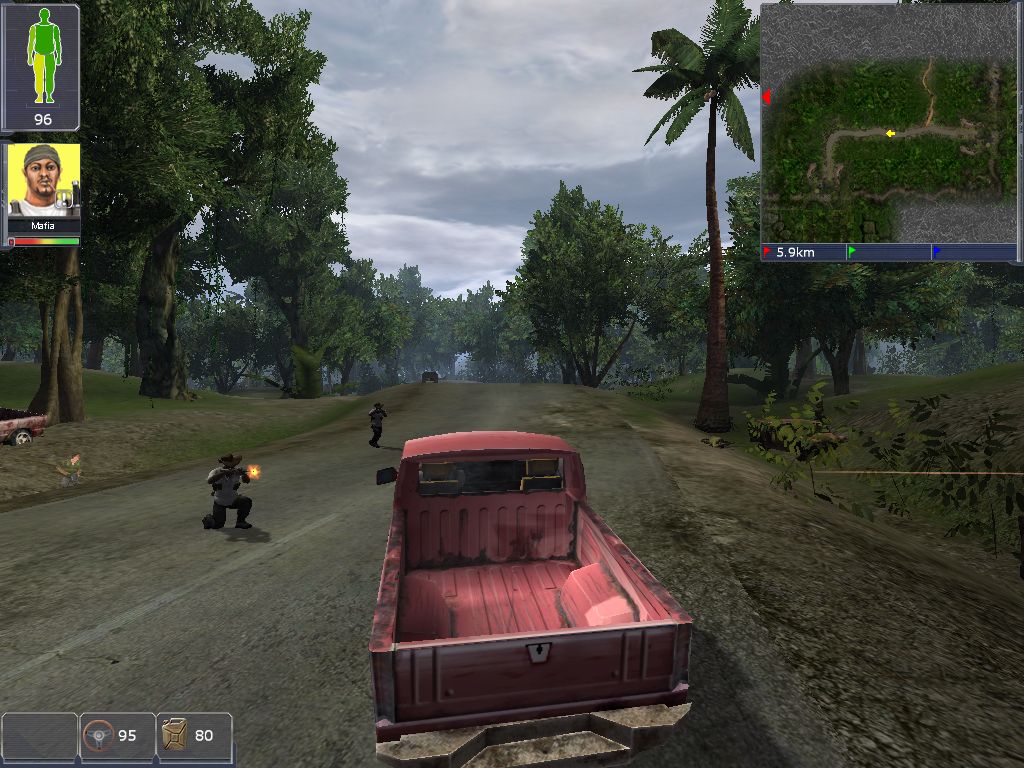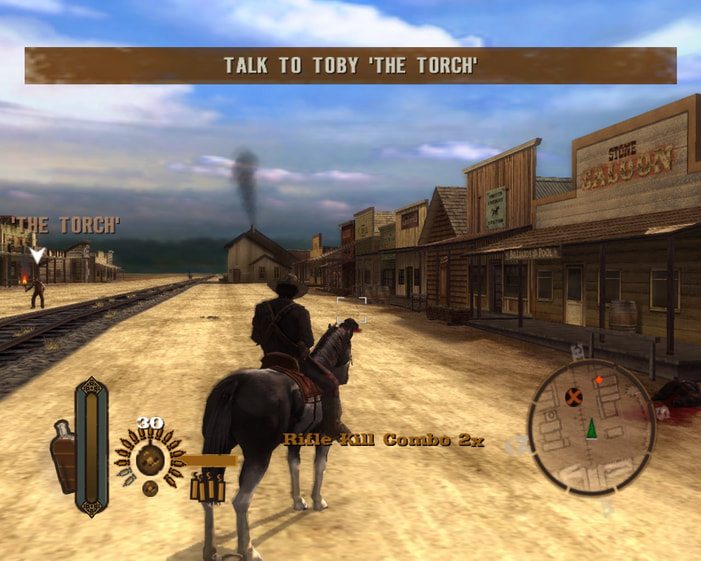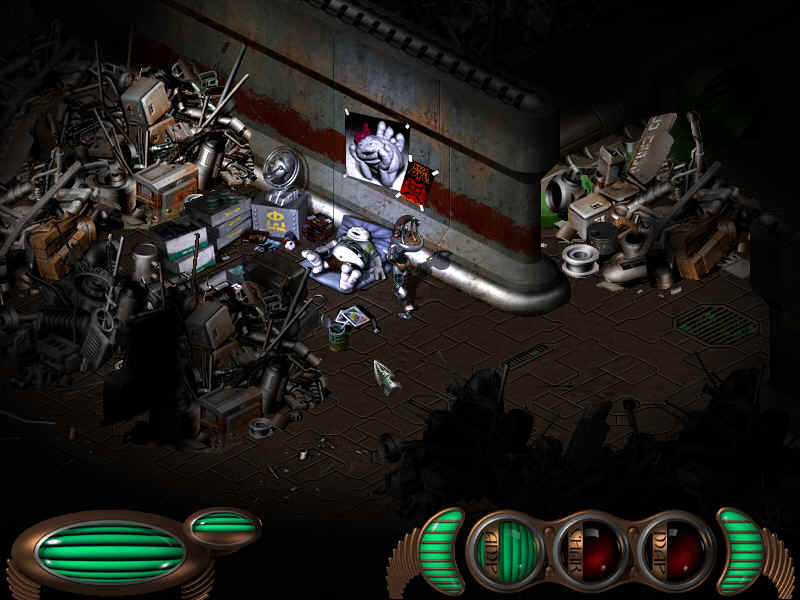Ten Computer RPGs You’ve Never Heard Of*
I struggle with the obscurity of my own indie RPG,
Frayed Knights, every day. That’s a common problem with indie games, in spite of our best efforts. But compared to the average indie release,
Frayed Knights is doing pretty well. It’s been in some bundles, made it onto Steam, gotten some good reviews and even won some awards that I’m very proud of. But it’s hard to even judge the “average” indie game because… shock… you’ve never heard of it. And what about the games that even more unknown than “average?”
The indie revolution has brought a whole new meaning to the concept of “obscure.” I love reading the
CRPG Addict’s blog, and he relishes in discovering these old, obscure computer RPGs. And admittedly, even as a guy who thought he knew his stuff, I am astonished by some of his finds. But he’s still working in the pre-World Wide Web days right now. Things kinda exploded a few years ago, and
keep exploding. About twice as many CRPGs released last year than in any year he’s covered so far, and he’s now knee-deep in the “golden age” of the game genre, circa 1990. However, the closer we get to the present day, the more opportunities also arise for… I dunno, call it “micro-publicity” or something. There’s always a tiny website that might mention or review a game (like this one), or some kind of bundle which might include your game.
Even so, a lot of these indie games release with nary a splash, sell little or bupkis, abandon the field, leave the website to be devoured by Asian vultures when the registration lapses, and are remembered by almost none. And… admittedly, these games are not usually the diamonds in the rough their creators probably believed. But in many cases, they weren’t bad, and even if they were, sometimes they contained some interesting seeds of good ideas.
I know a little bit about the challenge of making an RPG**, so I wanted to offer some celebration of the effort that went into making these titles, if nothing else. I fully admit that even as I try to pretend I’ve got my ear to the ground here, I’m unfocused enough to realize that if I’ve heard of it (let alone played it), it’s probably not really
that obscure. But in celebration of these nearly-forgotten titles, I wanted to share ten of the most obscure CRPGs I have ever played. If you can still find them, they may be worth checking out – in fact, some of them I heartily recommend. But here’s a word of warning: Because these games are little-known outside of certain circles, there’s not often a lot of help or walkthroughs available online. If you play them, prepare to solve them the old-fashioned way, with very little assistance.
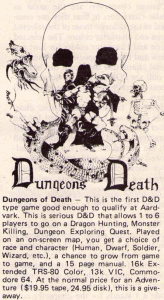
#1 –
Dungeons of Death / Dungeons of Magdarr (1983, Commodore 64): This title was only available as a mail-order from a regular multi-game ad in magazines like Compute! I remember digging through the BASIC code and discovering the dungeon maps defined as character strings, and thinking that was a pretty clever way to store it. It was a 3D first-person perspective title… and not a very good one. The odd thing is that I ordered it from this ad to the right. But I understand this game (Dungeons of Death) was a 2D, top-down game on the VIC-20 and other systems. Yet the game I received was a 3D, three-level dungeon (I remember it had 3 levels because, again, I spent about as much time looking through the code as I did playing it.)
I wish I still had the original packaging with the (Tape? Floppy? I can’t remember) and the manual (was it a single page?) Anyway, it was my very first computer RPG, and while it wasn’t the greatest experience
evar, it was a taste of things to come.
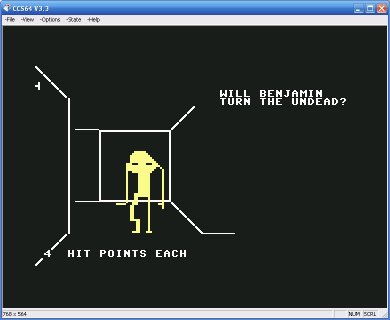
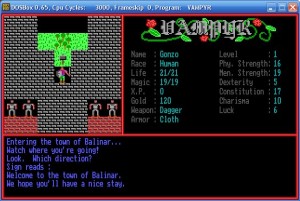
#2 –
Vampyr: Talisman of Invocation (1989, DOS): One day in 1991, on a library computer at my university, I discovered Shareware. I had no money, so this was a wonderful thing. On that day, I copied a whole bunch of these shareware / public domain games onto a couple of floppy drives and took them home. Among them was an
Ultima III-like CRPG called
Vampyr: Talisman of Invocation. It wasn’t that great of an
Ultima clone, to be honest, but it was really impressive that just a couple of guys managed to put this thing together. That was perhaps my first glimpse at to what would one day become the exciting world of indie CRPGs.
#3 –
The Devil Whiskey (2003, DOS): This one is hard to label as “obscure.” If hardcore CRPG fans were hipsters, this would be one of the hipster games out there, that the “in” crowd all know about, but nobody else does. It came out in an era where very few indie RPGs were being released, so it gained some momentum by being unique. It is very strongly influenced by
The Bard’s Tale, to a fault in my opinion (including an extremely hard first area – a town that is as hard as an old-school dungeon). It’s a first-person dungeon crawler with 3D graphics and quality artwork, now
(finally) available via Gamersgate.
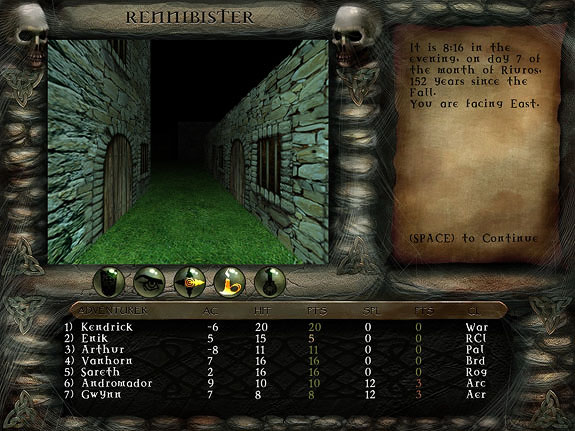
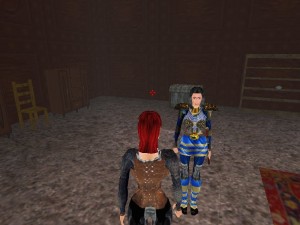
#4 –
Parhedros: Tunnels of Sethir (2007, Windows): An “old-school, dungeon-crawling, fantasy role-playing adventure, packed full of action, magic and mayhem” which only erred on the side of authenticity when it came to determining whether certain humanoid creatures wore clothes. The answer was, “No,” although the effort was not (at least not in the demo that I played) an attempt to titillate – not that the low-poly 3D graphics could really do much of that if that had been their actual intention. As far as I could see, there was nothing more provocative than the illustrations in the old 1st edition AD&D manuals. The site is still available, though, and is still NSFW:
Parhedros
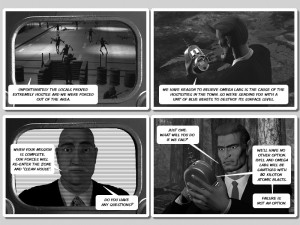
#5 –
The Omega Syndrome (2005?, Windows): Inspired by the original
Fallout games, this RPG was set in something of an alternate-history 1950s involving alien conspiracies. Yep, a non-fantasy indie RPG! Complete with comic-book style narratives and isometric, turn-based combat and pretty decent graphics, this was a sadly overlooked title. Eventually, in frustration, the developer removed the game entirely from sale, although you can still find various versions of the free demo out on the web.
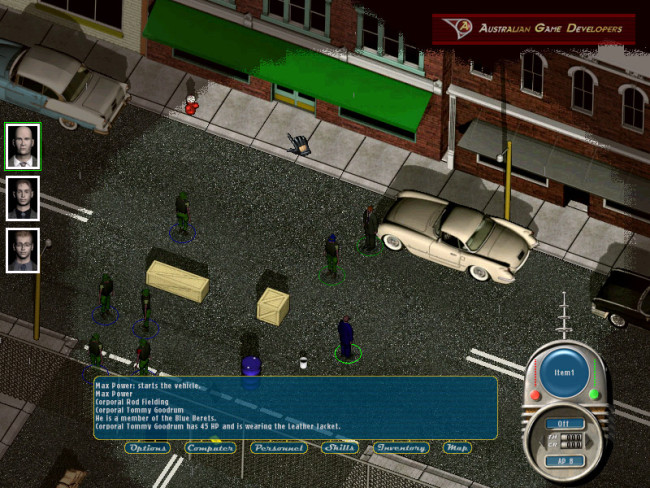
#6 –
The Three Musketeers – The Game (2009, Windows and Mac): An unusual title by Dingo Games based on the classic novel, The Three Musketeers. Again, non-fantasy! And with some very unusual opportunities (like playing Tennis – the sport of kings). And… hey, I am actually an affiliate for this relatively unknown game, and
you can get it here. Okay, shameless plug over. It’s hard for me to gauge its relative obscurity, but it seemed like it fell off every radar almost immediately after release.
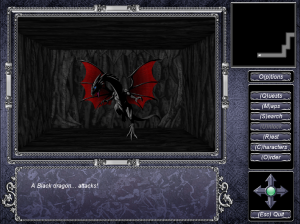
#7 –
Swords & Sorcery: Underworld (2010/2012, Windows): This game has been released a couple of times in progressively better quality, with a new version coming “soon” that promises to be even better. This is another game that I have trouble thinking of as being “obscure” because I’m personal friends of the developer, and it has received rave reviews from the little places on the Internet that I follow. And of course, *I* have played it, so how obscure can it be? But as a game that’s not on any major distribution sites, and has never (to my knowledge) been in any bundle, and rarely mentioned outside of a small circle of diehard western RPG-fans, I guess it qualifies.
Swords & Sorcery: Underworld is heavily influenced by the early
Might & Magic series, and offers considerable depth and length of gameplay, and lots and lots of dungeons and monsters, and not a small number of interesting puzzles to resolve. What it does borrow from the classics is put to good use, offering the same addictive properties. As the author has kept refining it (even while laboring on the sequel), it speaks highly of his dedication to the game long after its initial release. You can grab yourself a copy at the
Olderbytes official website.
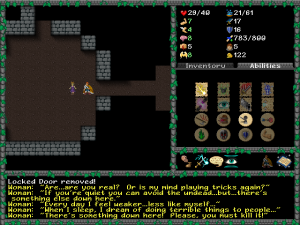
#8 –
Inaria (2011, Windows): Created by another friend of mine, Anthony Salter,
Inaria has finally been part of a (modest) bundle, so it’s no longer quite as obscure as it once was.
Inaria is an old-school-esque game of the
Ultima III-V style that started as a “game in 40 hours” project that gradually blossomed into a full-fledged (if relatively short), playable, entertaining game. The author updated the game since its original release, adding a major randomized dungeon (called “The Infinite”) and other features. You can help make this game less obscure by
getting it here.
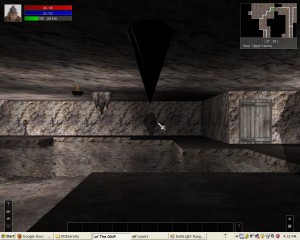
#9 –
Darklight Dungeon / Darklight Dungeon Eternity (2010 / 2012, Windows): This was actually the game that inspired this post. The website is gone, the game is no longer supported (and I’m not sure if it can even be purchased anymore), but you know… it was actually a pretty cool title that I had a bit of fun playing. The sequel –
Darklight Dungeon Eternity – included
FIFTY LEVELS of hand-built dungeon. The graphics were pretty programmer-art-y built from stock tools, and after a certain point the combat emphasis could get wearying, but it did seem like the game regularly provided some surprises. And… I have to ask… has ANYBODY other than Jesse Zoeller (the creator) actually played this bad boy to completion? Holy cow.
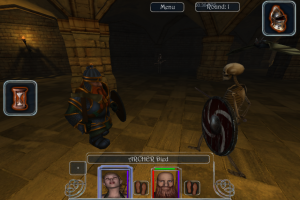
#10 –
Axe and Fate Rebirth (2013, Windows & Android): While the game doesn’t advertise itself as an Android port, it’s pretty obvious when you play it. While that in itself would be a recommendation against it (and it is), the game sports some pretty interesting features: It is a 3D free-moving turn-based tactical RPG with first-person perspective and up to two characters in the party. You can play with a solo character (with double the starting points) if you want, but it’s much harder that way.
It’s available on Desura.
Now, as I said before, I doubt I even come close to being having played the most obscure computer RPGs ever (although I think
Dungeons of Magdarr is up there). There are several more I could have listed, but these are my favorite (at least in terms of being unusual, really obscure, or really fun) I’m sure the community here knows plenty more. What CRPGs have you played that were theoretically publicly released (and may still be), yet very few people have ever heard of?
* Unless you read this blog, in which case you’ve probably heard of half of ’em.
** At least without something like RPG Maker, which makes it pretty dang easy to throw together a crappy RPG, and I know many of them were “released” by way of some forum post lost in antiquity. There’s no bottom to how obscure those theoretically “public” distributions can become, so I left RPG Maker games off this list. HOWEVER – Putting together a high-quality title is still insanely difficult, regardless of tools, and so I do not want anybody to take this as some kind of knock against RPG Maker titles. Many of my favorite indie RPGs were made with that tool, and I know dang well how much sweat and blood went into ’em!
